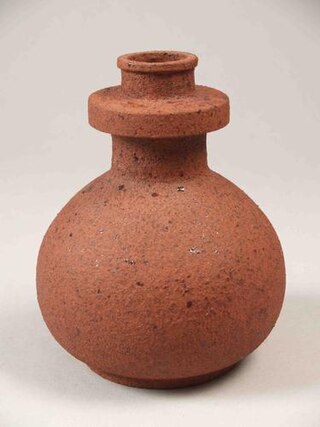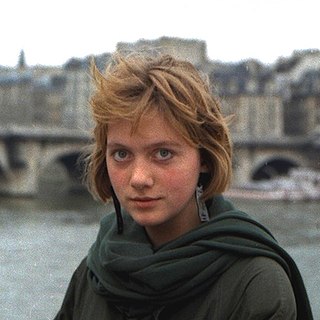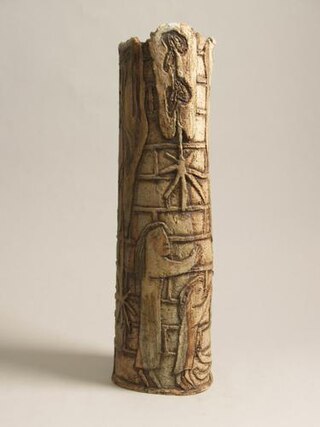
Johanna Greta (Hannie) Mein (Utrecht, 10 July 1933 - Vinkega, 14 February 2003) was a Dutch ceramist. [1]

Johanna Greta (Hannie) Mein (Utrecht, 10 July 1933 - Vinkega, 14 February 2003) was a Dutch ceramist. [1]
After secondary school Mein started working at a potter. She attended evening classes at the Gerrit Rietveld Academy in Amsterdam, where she was taught by Theo Dobbelman and Emmy van Deventer. [2] In Amsterdam she started her own studio together with Freek Noppen, whom she married in 1963. In 1969 the couple moved to the Frisian Vinkega. Mein had her studio and exhibition space in their farmhouse "the Bakehouse." [3] Her husband took care of the business section. Mein produced much pottery, but also unique pieces. Her work has been recognized by the naive style, often with stylized animal figures.
In 1988 Mein was involved in the establishment of the Foundation Ceramists Northern Netherlands. In 2003 the ceramics gallery of the furniture boulevard in Wolvega was named after her. In the same year in the Nationaal Vlechtmuseum in Noordwolde held a retrospective of her work. [4] The exhibition was organized by Mein herselves, but she did not lived to see the opening. She died a week before.
In 2005 the Hannie Mein Art Prize was instituted, for artists from Ooststellingwerf and Weststellingwerf, which that year was then presented to Guus Hellegers

Johannes Jacobus (Jan) van der Vaart was an influential Dutch ceramicist from the 20th century, known as founder of the abstract-geometric ceramics in the Netherlands.

Jan de Rooden was a Dutch ceramist and sculptor, who worked in Nijmegen, Paris, and Amsterdam.

Hans de Jong was a Dutch sculptor, designer and ceramist.
Theodorus Antonius Hubertus Maria (Theo) Dobbelman was a Dutch sculptor, ceramist and painter.
Dirk Hubers was a Dutch ceramist, who lived and worked in Bergen, North Holland and starting in 1958 in the United States. Hubers is notated for being "one of the first to apply abstract graphic designs on his objects."
Petrus Cornelis Constant (Piet) Wiegman was a Dutch painter, graphic artist, sculptor, ceramist and puppeteer.

Henk Trumpie was a Dutch ceramist and sculptor.

Gerardus Johannes (Geert) Lap was a Dutch ceramist, known for his new approach to ceramics characterized as clay minimalism.

Johan Gerard van Loon was a Dutch ceramist and textile artist.

Carel Adolph Lion Cachet was a Dutch designer, printmaker and ceramist, known for his role in transforming of Dutch decorative arts in the early 20th century.

Vilma Maria Helena Henkelman was a Dutch sculptor, ceramist, and photographer.
Emmy van Deventer-Molt was a Dutch ceramist, and lecturer at the Gerrit Rietveld Academie, and the AKV St. Joost.
Joost (Just) van Deventer was a Dutch ceramist, and lecturer the AKV St. Joost.

Wietske van Leeuwen is a Dutch ceramist, who lives and works in Monnickendam. Her works are constructed in a baroque style, with shells and fruit as recurring motifs.

Judith Magdolna Laqueur-Révész was a Hungarian-Dutch potter and sculptor.

Johanna Jacoba (Johnny) Rolf is a Dutch ceramist, drawing artist and sculptor.
Jan van Stolk was a Dutch ceramist.

Alida "Lies" Meijers-Cosijn was a Dutch ceramist. Her work is described as "fairytale like and poetic, but also sometimes bizarre and realistic."
Simone Haak is a Dutch visual artist, who has worked as monumental artist. sculptor and ceramicist, She is art dealer at Gallery Terra Delft, which she co-founded with Joke Doedens (1962).
Ecoline "Etie" Adrienne van Rees (1890-1973) was a Dutch ceramist.